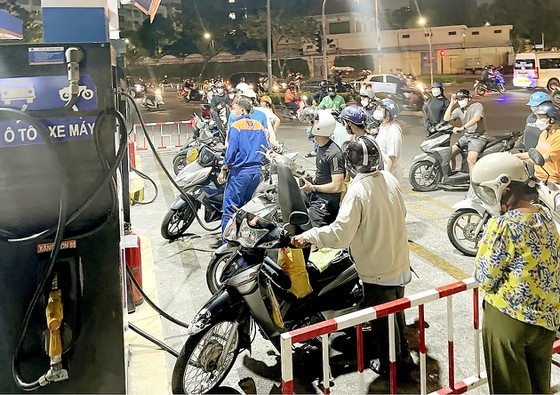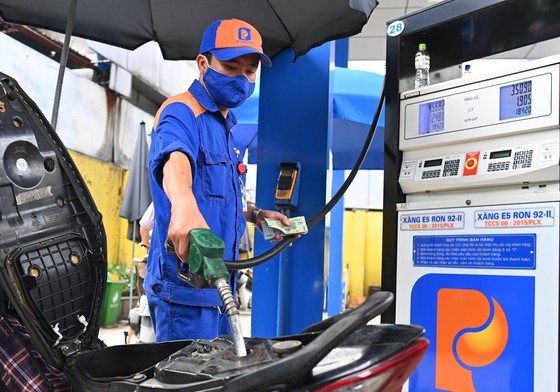
On February 8, it was easy to see most gas stations of Petrolimex, Saigon Petro, and KK Petro along National Highway No.1A passing Long An Province and Tien Giang Province were operating as usual. Only one located in Chau Thanh District of Tien Giang Province was closing.
Deputy Director of the Long An Province Department of Industry and Trade Duong Van Hoang Hoanh shared that certain gas businesses in the province asked for permission to momentarily close their stations because the discount rate for retailers is too low while the overhead cost is higher than usual.
A similar situation is happening in Soc Trang Province, leading to the local authorities’ decision to investigate and impose a strict fine if there is case of fuel hoarding.
In An Giang Province, 23 fuel enterprises requested for a temporary closedown since the supply is insufficient, fuel prices continuously increase; and thus they have no profit or even endure a money loss after paying staff salary. The local authorities have asked functional agencies to properly investigate them. If all are true, these businesses will receive suitable help to address the problem.
Other fuel retailers in the Mekong Delta provinces of Kien Giang, Ca Mau, and Hau Giang have reported the impossibility to purchase fuel from wholesale companies, and therefore cannot ensure sufficient amount of gas for retail distribution.
Director General of Nam Song Hau Petroleum Trading and Investment JSC. informed that the contract between his organization and Nghi Son Refinery and Petrochemical LLC cannot be fulfilled as the latter is reducing its capacity and might stop working on February 13. The former has to seek foreign fuel suppliers to ensure enough goods for its Mekong Delta market.
Many gas wholesalers in the Central region of Vietnam reported a profit loss of at least VND150 (US$0.007) per liter due to high transport fee and overhead costs.
Dak Lak Province stated it is witnessing the same situation where fuel businesses cannot obtain oil and have to sell only petrol, whose buying price is higher than selling one. Hence, they lose around VND4-5 million a day ($176-220) to ensure a stable retail supply.
President of Petrolimex Saigon Vo Van Tan affirmed that all of its gas stations are still in operation to provide around 10,000 tonnes, with an inventory rise by 10-15 percent to ensure energy security. 40 percent of this amount is imported, and this volume could be increased if domestic petrol refineries reduce their capacity or stop working.
Saigon Petro also committed to sufficient gas supply.
Representative of Petrolimex said that Vietnam now has various fuel supply sources, including import ones which account for 25 percent of the country demand. of Nghi Son Refinery and Petrochemical LLC is still in normal operation despite its capacity reduction.
To timely discover fuel hoarding, the Ministry of Industry and Trade has asked related units to carefully investigate suspected businesses and impose strict fines on any violators.

Related to Nghi Son Refinery and Petrochemical LLC, its current issues are now being addressed and it is expected to resume its full capacity from the middle of this February.
Deputy Prime Minister Le Van Thanh requested that since fuel is one of the essential commodities with a great impact on the national economy, it must be logically managed. He added that the Industry and Trade Ministry needs to be more active in monitoring fuel supply and distribution to minimize fuel shortage via prompt investigation to erase hoarding cases and maintenance of a balance between supply and demand.
In related news, Vice Chairwoman of Ho Chi Minh City People’s Committee Phan Thi Thang yesterday led a meeting with the HCMC Department of Industry and Trade, the Market Management Department, and fuel wholesalers to stabilize fuel distribution in the city.
Accordingly, the city is able to provide enough petrol and oil for individuals and businesses for 40-60 consecutive days.
























